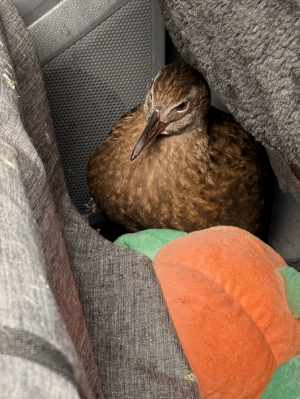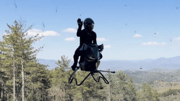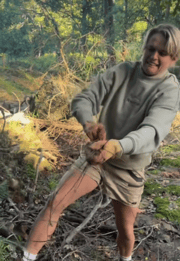Wild stowaway hitches 280km ride and surprises campers with unexpected discovery
By
Gian T
- Replies 0
We’ve all heard stories about finding a spider in the car or a possum in the shed.
Still, one lucky camper recently discovered a stowaway that’s truly one for the books—a cheeky, flightless bird that managed to hitch a ride for nearly 300 kilometres without anyone noticing!
A weekend adventure took an unexpected turn for Kim Ranger and her partner when they returned from a camping trip in the scenic Buller Gorge on New Zealand’s South Island.
After a long drive north to bustling Christchurch—about 280km away—they opened the back door of their trusty Ford Ranger ute, only to be greeted by a calm, wide-eyed weka sitting in the rear passenger footwell.
For those unfamiliar, the weka is a native New Zealand bird, famous for its curious nature, bold personality, and distinctive 'coo-et' call that echoes through the bush at night.
But this particular weka was the picture of stealth, remaining completely silent for the entire journey.
Kim recounted, 'When I got home, I opened the back door of the Ranger to get something, and there it was in the rear passenger footwell.
I couldn’t stop laughing, and then I came to the realisation, what on earth do you do with a weka in Christchurch?'
While the weka seemed perfectly content with its impromptu city break, it left behind a not-so-lovely souvenir.
'The weka didn’t show any signs of being distressed. When you opened the door, he just stood on the centre console and pooped—though he did set off the car alarm at 7 in the morning. The inside of the ute was literally covered in weka poop,' Kim said.
Photos released by New Zealand’s Department of Conservation (DOC) show the aftermath: white bird droppings splattered across the seats, dashboard, and floor mats.
It's not exactly the kind of road trip memory you want to keep!
While the story is hilarious, there’s a serious side to it.
Weka are not endangered, but their numbers have declined since humans arrived in New Zealand, and they play a unique role in their native ecosystems.
Accidentally moving them to new areas—like Christchurch, where there are no wild weka—can upset the delicate balance of local wildlife.
Weka are notorious for their appetite and curiosity, and they can pose a threat to lizards, seabirds, and other ground-dwelling creatures if introduced to new environments.
Kim did the right thing by locking the bird in the car with some food and water and calling the DOC for help.
The weka was checked by a vet and safely returned to its home territory, but the incident serves as a timely reminder for all campers and travellers.
Craig Alexander, DOC’s biodiversity supervisor, said, 'There is no wild weka in Christchurch, so we wouldn’t want to see them accidentally introduced here. It’s a good reminder for people to be mindful about unintentionally transporting animals in their equipment.'
Whether you’re camping in the bush, heading to the coast, or just enjoying a picnic in the park, it’s always a good idea to check your gear, vehicles, and even your shoes for unexpected animal guests before heading home.
Not only does this help protect our precious native wildlife, but it also saves you from a messy surprise!
While this story comes from across the ditch, Aussies aren’t immune to animal stowaways either!
From snakes curling up in car engines to frogs hiding in pot plants, our unique wildlife has a knack for turning up where you least expect it.
In fact, biosecurity officers at Australian airports and ports are always on the lookout for critters that might have hitched a ride in luggage, vehicles, or shipping containers.
If you ever find a wild animal in your car or belongings, remember to keep calm, avoid handling it directly, and contact your local wildlife rescue or biosecurity authority for advice.

Have you ever had a surprise animal encounter while travelling or camping? Maybe a possum in your tent, a lizard in your esky, or a bird in your boot? Share your funniest or most unexpected wildlife stories in the comments below—we’d love to hear them!
Still, one lucky camper recently discovered a stowaway that’s truly one for the books—a cheeky, flightless bird that managed to hitch a ride for nearly 300 kilometres without anyone noticing!
A weekend adventure took an unexpected turn for Kim Ranger and her partner when they returned from a camping trip in the scenic Buller Gorge on New Zealand’s South Island.
After a long drive north to bustling Christchurch—about 280km away—they opened the back door of their trusty Ford Ranger ute, only to be greeted by a calm, wide-eyed weka sitting in the rear passenger footwell.
For those unfamiliar, the weka is a native New Zealand bird, famous for its curious nature, bold personality, and distinctive 'coo-et' call that echoes through the bush at night.
But this particular weka was the picture of stealth, remaining completely silent for the entire journey.
Kim recounted, 'When I got home, I opened the back door of the Ranger to get something, and there it was in the rear passenger footwell.
I couldn’t stop laughing, and then I came to the realisation, what on earth do you do with a weka in Christchurch?'
While the weka seemed perfectly content with its impromptu city break, it left behind a not-so-lovely souvenir.
'The weka didn’t show any signs of being distressed. When you opened the door, he just stood on the centre console and pooped—though he did set off the car alarm at 7 in the morning. The inside of the ute was literally covered in weka poop,' Kim said.
Photos released by New Zealand’s Department of Conservation (DOC) show the aftermath: white bird droppings splattered across the seats, dashboard, and floor mats.
It's not exactly the kind of road trip memory you want to keep!
While the story is hilarious, there’s a serious side to it.
Weka are not endangered, but their numbers have declined since humans arrived in New Zealand, and they play a unique role in their native ecosystems.
Weka are notorious for their appetite and curiosity, and they can pose a threat to lizards, seabirds, and other ground-dwelling creatures if introduced to new environments.
Kim did the right thing by locking the bird in the car with some food and water and calling the DOC for help.
The weka was checked by a vet and safely returned to its home territory, but the incident serves as a timely reminder for all campers and travellers.
Craig Alexander, DOC’s biodiversity supervisor, said, 'There is no wild weka in Christchurch, so we wouldn’t want to see them accidentally introduced here. It’s a good reminder for people to be mindful about unintentionally transporting animals in their equipment.'
Whether you’re camping in the bush, heading to the coast, or just enjoying a picnic in the park, it’s always a good idea to check your gear, vehicles, and even your shoes for unexpected animal guests before heading home.
Not only does this help protect our precious native wildlife, but it also saves you from a messy surprise!
While this story comes from across the ditch, Aussies aren’t immune to animal stowaways either!
From snakes curling up in car engines to frogs hiding in pot plants, our unique wildlife has a knack for turning up where you least expect it.
In fact, biosecurity officers at Australian airports and ports are always on the lookout for critters that might have hitched a ride in luggage, vehicles, or shipping containers.
If you ever find a wild animal in your car or belongings, remember to keep calm, avoid handling it directly, and contact your local wildlife rescue or biosecurity authority for advice.
Key Takeaways
- A pair of weekend campers in New Zealand accidentally transported Weka, a flightless bird, 280km from Buller Gorge to Christchurch in their ute.
- The couple only discovered the stowaway weka when they arrived home, finding it calmly sitting in the rear passenger footwell.
- The weka made a considerable mess in the ute but did not become distressed, and was eventually assessed by a vet and returned home with help from the Department of Conservation.
- Authorities used the incident to remind campers to check their vehicles for animal stowaways, as accidentally moving native species can negatively affect local ecosystems.








